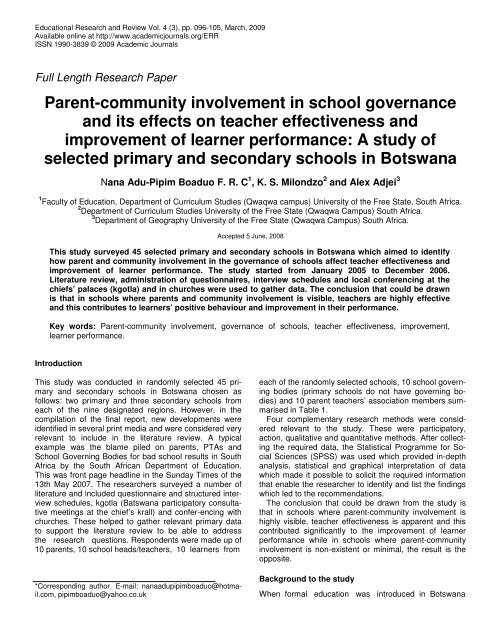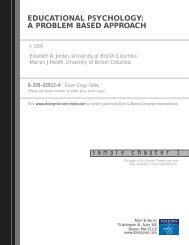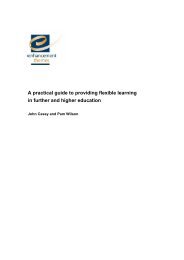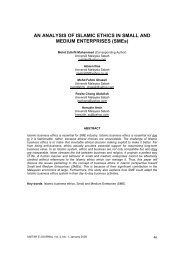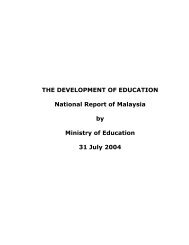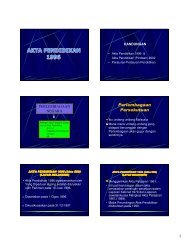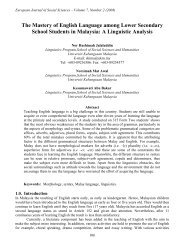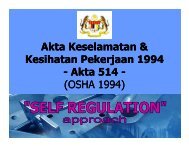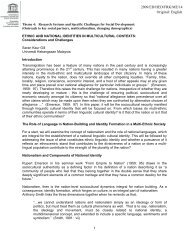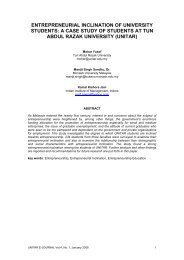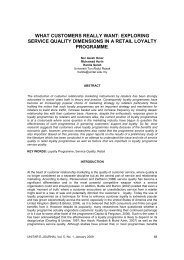Parent-community involvement in school ... - Teo-Education
Parent-community involvement in school ... - Teo-Education
Parent-community involvement in school ... - Teo-Education
Create successful ePaper yourself
Turn your PDF publications into a flip-book with our unique Google optimized e-Paper software.
<strong>Education</strong>al Research and Review Vol. 4 (3), pp. 096-105, March, 2009<br />
Available onl<strong>in</strong>e at http://www.academicjournals.org/ERR<br />
ISSN 1990-3839 © 2009 Academic Journals<br />
Full Length Research Paper<br />
<strong>Parent</strong>-<strong>community</strong> <strong><strong>in</strong>volvement</strong> <strong>in</strong> <strong>school</strong> governance<br />
and its effects on teacher effectiveness and<br />
improvement of learner performance: A study of<br />
selected primary and secondary <strong>school</strong>s <strong>in</strong> Botswana<br />
Nana Adu-Pipim Boaduo F. R. C 1 , K. S. Milondzo 2 and Alex Adjei 3<br />
1 Faculty of <strong>Education</strong>, Department of Curriculum Studies (Qwaqwa campus) University of the Free State, South Africa.<br />
2 Department of Curriculum Studies University of the Free State (Qwaqwa Campus) South Africa.<br />
3 Department of Geography University of the Free State (Qwaqwa Campus) South Africa.<br />
Accepted 5 June, 2008<br />
This study surveyed 45 selected primary and secondary <strong>school</strong>s <strong>in</strong> Botswana which aimed to identify<br />
how parent and <strong>community</strong> <strong><strong>in</strong>volvement</strong> <strong>in</strong> the governance of <strong>school</strong>s affect teacher effectiveness and<br />
improvement of learner performance. The study started from January 2005 to December 2006.<br />
Literature review, adm<strong>in</strong>istration of questionnaires, <strong>in</strong>terview schedules and local conferenc<strong>in</strong>g at the<br />
chiefs’ palaces (kgotla) and <strong>in</strong> churches were used to gather data. The conclusion that could be drawn<br />
is that <strong>in</strong> <strong>school</strong>s where parents and <strong>community</strong> <strong><strong>in</strong>volvement</strong> is visible, teachers are highly effective<br />
and this contributes to learners’ positive behaviour and improvement <strong>in</strong> their performance.<br />
Key words: <strong>Parent</strong>-<strong>community</strong> <strong><strong>in</strong>volvement</strong>, governance of <strong>school</strong>s, teacher effectiveness, improvement,<br />
learner performance.<br />
Introduction<br />
This study was conducted <strong>in</strong> randomly selected 45 primary<br />
and secondary <strong>school</strong>s <strong>in</strong> Botswana chosen as<br />
follows: two primary and three secondary <strong>school</strong>s from<br />
each of the n<strong>in</strong>e designated regions. However, <strong>in</strong> the<br />
compilation of the f<strong>in</strong>al report, new developments were<br />
identified <strong>in</strong> several pr<strong>in</strong>t media and were considered very<br />
relevant to <strong>in</strong>clude <strong>in</strong> the literature review. A typical<br />
example was the blame piled on parents, PTAs and<br />
School Govern<strong>in</strong>g Bodies for bad <strong>school</strong> results <strong>in</strong> South<br />
Africa by the South African Department of <strong>Education</strong>.<br />
This was front page headl<strong>in</strong>e <strong>in</strong> the Sunday Times of the<br />
13th May 2007. The researchers surveyed a number of<br />
literature and <strong>in</strong>cluded questionnaire and structured <strong>in</strong>terview<br />
schedules, kgotla (Batswana participatory consultative<br />
meet<strong>in</strong>gs at the chief’s krall) and confer-enc<strong>in</strong>g with<br />
churches. These helped to gather relevant primary data<br />
to support the literature review to be able to address<br />
the research questions. Respondents were made up of<br />
10 parents, 10 <strong>school</strong> heads/teachers, 10 learners from<br />
*Correspond<strong>in</strong>g author. E-mail: nanaadupipimboaduo@hotmail.com,<br />
pipimboaduo@yahoo.co.uk<br />
each of the randomly selected <strong>school</strong>s, 10 <strong>school</strong> govern<strong>in</strong>g<br />
bodies (primary <strong>school</strong>s do not have govern<strong>in</strong>g bodies)<br />
and 10 parent teachers’ association members summarised<br />
<strong>in</strong> Table 1.<br />
Four complementary research methods were considered<br />
relevant to the study. These were participatory,<br />
action, qualitative and quantitative methods. After collect<strong>in</strong>g<br />
the required data, the Statistical Programme for Social<br />
Sciences (SPSS) was used which provided <strong>in</strong>-depth<br />
analysis, statistical and graphical <strong>in</strong>terpretation of data<br />
which made it possible to solicit the required <strong>in</strong>formation<br />
that enable the researcher to identify and list the f<strong>in</strong>d<strong>in</strong>gs<br />
which led to the recommendations.<br />
The conclusion that could be drawn from the study is<br />
that <strong>in</strong> <strong>school</strong>s where parent-<strong>community</strong> <strong><strong>in</strong>volvement</strong> is<br />
highly visible, teacher effectiveness is apparent and this<br />
contributed significantly to the improvement of learner<br />
performance while <strong>in</strong> <strong>school</strong>s where parent-<strong>community</strong><br />
<strong><strong>in</strong>volvement</strong> is non-existent or m<strong>in</strong>imal, the result is the<br />
opposite.<br />
Background to the study<br />
When formal education was <strong>in</strong>troduced <strong>in</strong> Botswana
Boaduo FRC et al. 097<br />
Table 1. List of respondents used <strong>in</strong> the survey.<br />
Respondents Number of respondents Total<br />
<strong>Parent</strong>s 10 parents x 10 <strong>school</strong>s x 9 900<br />
School heads and teachers 10 <strong>school</strong> heads/teachers x 10 <strong>school</strong>s x 9 900<br />
Learners/students/pupils 10 students x 10 <strong>school</strong>s x 9 900<br />
School govern<strong>in</strong>g bodies 10 <strong>in</strong> secondary <strong>school</strong>s only x 9 90<br />
<strong>Parent</strong>-Teachers Associations 10 x 9 90<br />
TOTAL RESPONDENTS 2880<br />
<strong>school</strong>s were regarded as exceptional environment for<br />
teachers, <strong>school</strong> adm<strong>in</strong>istrators and learners. To a large<br />
extent, parents and the communities regarded themselves<br />
as someth<strong>in</strong>g outside of the education system.<br />
When the child misbehaves at home parents usually<br />
used to comment “Is this what you’ve been taught at<br />
<strong>school</strong>” Worst still for any misbehaviour, they would<br />
always <strong>in</strong>dicate to the child “I am go<strong>in</strong>g to report you to<br />
your teacher.” This k<strong>in</strong>d of attitude put the onus of<br />
responsibility on the teacher. Teachers too did not see<br />
parents and the <strong>community</strong> as <strong>in</strong>struments which could<br />
be used to advance their activities as <strong>in</strong>dicated by Farrant<br />
(1980, 2):<br />
“Traditionally, <strong>school</strong>s have tended to keep parents out,<br />
us<strong>in</strong>g the argument that a professional skill such as<br />
teach<strong>in</strong>g must be carried out without <strong>in</strong>terference. Today,<br />
this attitude is chang<strong>in</strong>g and, <strong>school</strong>s are try<strong>in</strong>g to encourage<br />
parents to take a greater <strong>in</strong>terest <strong>in</strong> the <strong>school</strong>”(p.<br />
250).<br />
In short, the <strong>school</strong> was considered as someth<strong>in</strong>g outside<br />
of the parents and communities.<br />
However, <strong>in</strong> the early 1980s, which heralded new developments<br />
<strong>in</strong> the governance of <strong>school</strong>s <strong>in</strong> Botswana, the<br />
trend shifted to <strong>in</strong>volve parents and the communities. In<br />
our modern era of scientific and technological advancement<br />
<strong>in</strong> almost every aspect of human endeavour, there<br />
has been relentless agitation for accountability from<br />
public <strong>in</strong>stitutions by <strong>in</strong>terested parties. In the education<br />
system this agitation is highly visible and as such parent<strong>community</strong><br />
<strong><strong>in</strong>volvement</strong> has been advocated, especially<br />
<strong>in</strong> the United K<strong>in</strong>gdom and the United States of America<br />
(M<strong>in</strong>istry of <strong>Education</strong>, Botswana (MoE, 1993). This is<br />
highly desirable because <strong>in</strong> our post-modern society we<br />
can no longer get every work <strong>in</strong> the <strong>school</strong> system effectively<br />
and efficiently done by teachers, students and<br />
<strong>school</strong> adm<strong>in</strong>istrators alone. The reason is that <strong>school</strong><br />
governance has become very complex for any one group<br />
to successfully do it alone (Fullan, 2001). Furthermore,<br />
the new ways of collaborat<strong>in</strong>g are threaten<strong>in</strong>g and very<br />
complex as well. However, it has become necessary to<br />
move towards a new paradigm <strong>in</strong> the governance (adm<strong>in</strong>istration,<br />
organization and management) of the <strong>school</strong><br />
system. <strong>Parent</strong>-<strong>community</strong> on one hand and the teachers,<br />
learners and the <strong>school</strong> adm<strong>in</strong>istrators on the other<br />
hand, should move towards each other to be able to<br />
address and resolve concurrent pert<strong>in</strong>ent educational<br />
problems mutually.<br />
The question of parent-<strong>community</strong> <strong><strong>in</strong>volvement</strong> <strong>in</strong><br />
<strong>school</strong>s has been the subject of many books as well as<br />
research studies (Abed, 1992; Anderson, 1991; Fullan,<br />
2001; Henry, 1996), but specific studies of this nature<br />
concentrat<strong>in</strong>g on a selected education system <strong>in</strong> a selected<br />
African country like Botswana have been very few.<br />
Review of some of the literature consulted revealed a<br />
mass of contradictions, confusion and even hopelessness<br />
for understand<strong>in</strong>g, let alone, cop<strong>in</strong>g with the relationship<br />
between parent-communities and <strong>school</strong>s. One<br />
source concurs that:<br />
“The closer the parent is to the education of the child, the<br />
greater the impact on child development and educational<br />
achievement” (Fullan, 2001, p. 198).<br />
Some of the literature sources advised that the decision<br />
about the precise nature of parent <strong><strong>in</strong>volvement</strong> must take<br />
<strong>in</strong>to account cultural, ethnic and class differences as well<br />
as variations related to the age and gender of learners<br />
(Abed, 1992; Fullan, 2001). Furthermore, Shaeffer (1994)<br />
is of the op<strong>in</strong>ion that <strong>in</strong> determ<strong>in</strong><strong>in</strong>g what conditions<br />
parent-<strong>community</strong> <strong><strong>in</strong>volvement</strong> is most beneficial we<br />
have to understand the different forms of parent-<strong>community</strong><br />
participation and their consequences for the <strong>school</strong>,<br />
the learner and other personnel <strong>in</strong> the whole <strong>school</strong><br />
system. The reason provided by Shaeffer and others is<br />
that certa<strong>in</strong> forms of <strong><strong>in</strong>volvement</strong> produce positive results<br />
while others may be wasteful or completely counter<br />
productive (Anderson, 1991; Shaeffer, 1994).<br />
Henry’s study of parent-<strong>school</strong> collaboration <strong>in</strong> poor<br />
neighbourhood <strong>in</strong> the USA concluded that:<br />
“Educators have to go out <strong>in</strong>to their communities with<br />
empathy and <strong>in</strong>teract mean<strong>in</strong>gfully with their constituents”<br />
(1996, p. 132).<br />
Henry’s observation will def<strong>in</strong>itely <strong>in</strong>volve shifts <strong>in</strong> power<br />
and <strong>in</strong>fluence, but it is what new power arrangements can<br />
accomplish that really matters to the parent-<strong>community</strong><strong>school</strong><br />
adm<strong>in</strong>istrators’ relationship so as to be able to<br />
govern <strong>school</strong>s amicably.<br />
Sarason (1995,) is sceptical about this new power game<br />
advocated by Henry and <strong>in</strong>dicated that:
098 Educ. Res. Rev.<br />
“To seek power is to raise and beg<strong>in</strong> to answer the question:<br />
To seek power to change what Chang<strong>in</strong>g the<br />
forces of power<strong>in</strong>g no way guarantees that everyth<strong>in</strong>g will<br />
change....”(p. 53).<br />
The researcher is of the view that, it is not a matter of<br />
seek<strong>in</strong>g power to change tradition, but to seek <strong>in</strong>put from<br />
stakeholders to be able to make the change mean<strong>in</strong>gful,<br />
empower<strong>in</strong>g and contribute towards good governance of<br />
<strong>school</strong>s <strong>in</strong> communities where all stakeholders will feel<br />
that they are part and parcel of the whole system of<br />
<strong>school</strong><strong>in</strong>g and not just the bus<strong>in</strong>ess of <strong>school</strong> teachers<br />
and adm<strong>in</strong>istrators.<br />
To the question of: What will it take to mobilise more<br />
people and resources <strong>in</strong> the provision of quality services<br />
<strong>in</strong> the education of all learners To answer this question<br />
several sources were reviewed and the revelation was<br />
that teachers and <strong>school</strong> adm<strong>in</strong>istrators cannot do it<br />
alone (Bryk et al., 1998; Coleman, 1998; Henry, 1996;<br />
Mortimore et al., 1988; Rosenholtz, 1989; Sarason, 1995,<br />
Ste<strong>in</strong>berg, 1996). Accord<strong>in</strong>g to these studies, the expertise<br />
and specific experiences of parents and other <strong>community</strong><br />
members are crucial and largely untapped resources<br />
who have assets and expertise that are essential<br />
to the partnership. These studies further emphasise<br />
that parents-<strong>community</strong> have knowledge of their children<br />
that is not available to anyone else. Such knowledge<br />
would be of immense help to the teachers. Further to this,<br />
parent-<strong>community</strong> have vested and committed <strong>in</strong>terest <strong>in</strong><br />
their children’s success, and they also have valuable<br />
knowledge and skills to contribute that usually spr<strong>in</strong>g<br />
from their <strong>in</strong>terests, hobbies, occupations and place <strong>in</strong><br />
the <strong>community</strong> <strong>in</strong>clud<strong>in</strong>g their professions.<br />
The study by Coleman (1998) was very clear about the<br />
benefits and the necessity of parents-<strong>community</strong> engagement.<br />
Based on his <strong>in</strong>terviews and surveys of parent<strong>community</strong><br />
members, learners and teachers collaboration<br />
Coleman argued that:<br />
“Learners commitment to <strong>school</strong><strong>in</strong>g (or engagement <strong>in</strong><br />
learn<strong>in</strong>g) is primarily shaped by parents through the<br />
curriculum at the home and parents <strong><strong>in</strong>volvement</strong> is an<br />
alterable variable which can be <strong>in</strong>fluenced by <strong>school</strong> and<br />
teacher practices” (p. 11).<br />
Coleman strongly believed that (1998), the power of<br />
three, namely “parent-<strong>community</strong>, learner and the teacher”<br />
(p. 14) is very crucial because when the development<br />
of learner responsibility occurs; it is a function of the<br />
attitudes and practices of all the triad members. This idea<br />
is unfl<strong>in</strong>ch<strong>in</strong>gly supported by Fullan (2001) and listed the<br />
vital elements of the triad that could be derived as<br />
follows.<br />
“For teachers, beliefs about parental <strong><strong>in</strong>volvement</strong>, learner<br />
capabilities and the importance of deliberate teach<strong>in</strong>g of<br />
responsibility <strong>in</strong> the classroom are crucial. For learners,<br />
communication with parents-<strong>community</strong> about <strong>school</strong>,<br />
confidence <strong>in</strong> the ability to do the work, valu<strong>in</strong>g <strong>school</strong> for<br />
its importance to the future collaboration with teachers is<br />
significant. For parents, valu<strong>in</strong>g <strong>school</strong> as an <strong>in</strong>vitational<br />
teacher attitude and communication with learners about<br />
the <strong>school</strong> cannot be over emphasised” (p. 200).<br />
Coleman (1998) concluded that student commitment can<br />
be susta<strong>in</strong>ed and strengthened by collaborative teacher<br />
attitudes expressed <strong>in</strong> and through their practices and for<br />
that reason, strong connections with the home are essential<br />
to the success of the task.<br />
Teachers can facilitate and encourage parent-<strong>community</strong><br />
collaboration through some simple practices all well<br />
known but not implemented consistently <strong>in</strong> many <strong>school</strong>s.<br />
Most parents are conscious that much more could be<br />
done to help their children learn <strong>in</strong> the classroom and <strong>in</strong><br />
the home as well. For consistency and preciseness about<br />
the role of parent-<strong>community</strong> <strong><strong>in</strong>volvement</strong> <strong>in</strong> <strong>school</strong>s;<br />
Mortimore et al. (1988) undertook a study of <strong>school</strong> effectiveness<br />
and found that parental <strong><strong>in</strong>volvement</strong> practices<br />
represented one of the twelve key factors that differentiated<br />
effective from less effective <strong>school</strong>s. They wrote:<br />
“Our f<strong>in</strong>d<strong>in</strong>gs show parent <strong><strong>in</strong>volvement</strong> <strong>in</strong> the life of the<br />
<strong>school</strong> to be a positive <strong>in</strong>fluence upon learners’ progress<br />
and development. This <strong>in</strong>cluded help <strong>in</strong> the classroom<br />
and on educational visits and attendance at meet<strong>in</strong>gs to<br />
discuss learners’ progress… <strong>Parent</strong>s’ <strong><strong>in</strong>volvement</strong> <strong>in</strong> learners’<br />
educational development with<strong>in</strong> the home was also<br />
clearly beneficial. <strong>Parent</strong>s who read to their children,<br />
heard them read and provide them with access to books<br />
at home had a positive effect upon their children’s’<br />
learn<strong>in</strong>g” (p. 225).<br />
Rosenholt’s (1989) research found out that:<br />
“Teachers from struck <strong>school</strong>s held no goals for parent<br />
participation <strong>in</strong> their activities while teachers from mov<strong>in</strong>g<br />
<strong>school</strong>s focused their efforts on <strong>in</strong>volv<strong>in</strong>g parents with<br />
academic content thereby bridg<strong>in</strong>g the learn<strong>in</strong>g chasm<br />
between the home and the <strong>school</strong>”(p. 152).<br />
Bryk et al (1998) reported that those <strong>school</strong>s that were<br />
more successful were found to be committed to develop<strong>in</strong>g<br />
“the engagement of parents and <strong>community</strong><br />
resources” (p. 127-128). To buttress this Mr. Fraiser<br />
Tlhoi-we (In the Voice 30 th March 2007, p. 20), the head<br />
of Mater-Spei School <strong>in</strong> Francistown <strong>in</strong> the North-Eastern<br />
District of Botswana <strong>in</strong> his address to parents succ<strong>in</strong>ctly<br />
<strong>in</strong>dicated that:<br />
“Without parental support, it becomes difficult for<br />
teachers to be effective <strong>in</strong> discipl<strong>in</strong><strong>in</strong>g children. All these<br />
key elements are terribly important for any <strong>school</strong> to<br />
perform well academically. In many <strong>in</strong>stances, students<br />
whose parents never attend meet<strong>in</strong>gs fail exams”.<br />
In addition to what is expressed above, (Angela Matlhape<br />
In the Ghetto Metro <strong>in</strong> the Weekend Sun, 9 th May 2007),
Boaduo FRC et al. 099<br />
the Headmaster of Tashatha Junior Secondary School at<br />
Tati Sid<strong>in</strong>g also <strong>in</strong> the North-East District of Botswana<br />
compla<strong>in</strong>ed by stat<strong>in</strong>g that:<br />
“Some parents seem not to care about their children’s<br />
performance. Some parents are not forthcom<strong>in</strong>g when it<br />
comes to discuss<strong>in</strong>g <strong>school</strong> issues. They never attend<br />
PTA meet<strong>in</strong>gs. This is so serious that it has even affected<br />
student’s performance <strong>in</strong> our <strong>school</strong>”.<br />
She further po<strong>in</strong>ted out that most parents have failed to<br />
collect their children’s <strong>school</strong> report for term one and that<br />
the <strong>school</strong> management has decided not to give reports<br />
to students until their parents come to the <strong>school</strong> to<br />
collect them. This is an <strong>in</strong>dication that there is a big rift<br />
between the <strong>school</strong> adm<strong>in</strong>istrators and the <strong>community</strong>. In<br />
all the literature sources consulted, attention was not paid<br />
to how this <strong><strong>in</strong>volvement</strong> contributes to teacher effectiveness<br />
which consequently would help the learners to<br />
improve <strong>in</strong> performance which this study <strong>in</strong>tends to unravel.<br />
Statement of the problem<br />
Does parent-<strong>community</strong> <strong><strong>in</strong>volvement</strong> <strong>in</strong> the Governance<br />
of <strong>school</strong>s (adm<strong>in</strong>istration, management and organisation)<br />
affect teacher effectiveness and improvement of<br />
learner performance <strong>in</strong> <strong>school</strong>s <strong>in</strong> Botswana<br />
Research questions<br />
The follow<strong>in</strong>g were the ma<strong>in</strong> research questions:<br />
1. Do parents and communities get <strong>in</strong>volved <strong>in</strong> <strong>school</strong>s<br />
2. How long have they been <strong>in</strong>volved <strong>in</strong> <strong>school</strong>s<br />
3. What is the extent of the <strong><strong>in</strong>volvement</strong><br />
4. What specific roles do they play<br />
5. What is the effect of the <strong><strong>in</strong>volvement</strong> on teacher<br />
effectiveness and improvement of learner performance<br />
6. How can parent-<strong>community</strong> partnership be encouraged<br />
to complement the work of the <strong>school</strong> adm<strong>in</strong>istrators<br />
Aims of the study<br />
This study aimed to provide <strong>in</strong>sight <strong>in</strong>to the follow<strong>in</strong>g:<br />
• To identify the roles parent-<strong>community</strong> plays <strong>in</strong> the<br />
runn<strong>in</strong>g of <strong>school</strong>s.<br />
• To identify the effects these roles can have on teacher<br />
effectiveness and improvement <strong>in</strong> learner performance.<br />
In addition to the list above, the study also had the<br />
follow<strong>in</strong>g subsidiary aims:<br />
1. To provide a brief history of parent-<strong>community</strong> <strong><strong>in</strong>volvement</strong><br />
<strong>in</strong> <strong>school</strong>s <strong>in</strong> Botswana.<br />
2. To provide <strong>in</strong>formation about new developments <strong>in</strong><br />
parent-<strong>community</strong> <strong><strong>in</strong>volvement</strong> <strong>in</strong> <strong>school</strong>s elsewhere.<br />
3. To briefly outl<strong>in</strong>e the extent and trends of <strong><strong>in</strong>volvement</strong><br />
of parent-<strong>community</strong> <strong>in</strong> <strong>school</strong>s.<br />
4. To use the f<strong>in</strong>d<strong>in</strong>gs to show how parent-<strong>community</strong><br />
<strong><strong>in</strong>volvement</strong> <strong>in</strong> <strong>school</strong> governance can affect teacher<br />
effectiveness and the improvement <strong>in</strong> learner performance.<br />
Applicable and relevant methodological choice and application<br />
This study is about parent-<strong>community</strong> <strong><strong>in</strong>volvement</strong> <strong>in</strong> the governance<br />
of <strong>school</strong>s (adm<strong>in</strong>istration, management and organisation) <strong>in</strong><br />
Botswana. This is a purely <strong>community</strong>-oriented study. It was,<br />
therefore, identified that methodological paradigms, be it action,<br />
participatory, qualitative or quantitative are not merely collection of<br />
research methods and strategies used for a research study. For<br />
any methodology to be considered, selected and used <strong>in</strong> a given<br />
study, like this one, certa<strong>in</strong> assumptions and values regard<strong>in</strong>g their<br />
choice and use should be considered under specific circumstances<br />
(Boaduo, 1998). In this study, the researcher encountered both the<br />
actual methods and the underly<strong>in</strong>g philosophies regard<strong>in</strong>g their use<br />
and the <strong>in</strong>herent awareness of the limitations of equally applicable<br />
methods. However, it was identified that:<br />
All research methods and techniques are task specific.<br />
The task is def<strong>in</strong>ed by the research goals.<br />
Different studies use different methods and techniques relevant<br />
and applicable to the study because they have different aims and<br />
objectives.<br />
The methods and techniques must be specific, relevant and<br />
applicable for the task at hand.<br />
Both methods and techniques should apply equally to data collection,<br />
treatment, analysis and <strong>in</strong>terpretation as well as for sampl<strong>in</strong>g,<br />
questionnaire and <strong>in</strong>terview schedules design.<br />
The implication, <strong>in</strong> this respect, is that qualitative, quantitative,<br />
action and participatory research methods and techniques are used<br />
because they complement each other for verifiability and reliability<br />
of data. For <strong>in</strong>stance, where data were required to be quantified the<br />
quantitative method was applied especially dur<strong>in</strong>g the treatment<br />
and analysis of questionnaire and <strong>in</strong>terview responses. Dur<strong>in</strong>g the<br />
f<strong>in</strong>al analysis and <strong>in</strong>terpretation of the gathered data, the qualitative<br />
method was used.<br />
Significance of action and participatory research methods<br />
applied <strong>in</strong> this study<br />
The central theme of the study is about people and their problems<br />
related specifically to parents, <strong>community</strong>, the learner, the teacher,<br />
the <strong>school</strong> and the <strong>school</strong> adm<strong>in</strong>istrators. Batswana want to be<br />
<strong>in</strong>volved <strong>in</strong> <strong>school</strong>s to be able to help to enhance teacher effecttiveness<br />
which will contribute towards the improvement <strong>in</strong> the<br />
performance of their children <strong>in</strong> <strong>school</strong>s. Action and participatory<br />
research methods are self-reflective <strong>in</strong>quiry <strong>in</strong>to social situations.<br />
They help to improve the rationality and justice of the social and<br />
educational practices, understand<strong>in</strong>g them and the situations <strong>in</strong><br />
which they are situated and carried out (Anderson, 1990; Carl-Hill,<br />
1988). This study was to f<strong>in</strong>d out about the op<strong>in</strong>ion of Batswana<br />
and their <strong><strong>in</strong>volvement</strong> <strong>in</strong> the education of their children. It is<br />
necessary to <strong>in</strong>volve them <strong>in</strong> a participatory manner through direct<br />
<strong>in</strong>tervention, questionnaire, <strong>in</strong>terview and kgotla (local <strong>community</strong><br />
gather<strong>in</strong>g at the chief’s kraal) and dur<strong>in</strong>g church attendance<br />
(Participatory Research, 1982).<br />
Action and participatory research play a liberat<strong>in</strong>g role <strong>in</strong> the<br />
learn<strong>in</strong>g process by provid<strong>in</strong>g the development of critical under-
100 Educ. Res. Rev.<br />
stand<strong>in</strong>g of the social problem under <strong>in</strong>vestigation, its structural<br />
causes and possibilities for overcom<strong>in</strong>g them (McNiff, 1995; Participatory<br />
Research, 1982; Clark, 1972). Action and participatory<br />
research call for democratic <strong>in</strong>teraction between the researcher and<br />
those among whom the research is conducted (Bless and Higson-<br />
Smith, 2004; Maykut and Morehouse, 2003)<br />
Action and participatory research is composed of three <strong>in</strong>terrelated<br />
processes relevant to this study, namely:<br />
1. The collective <strong>in</strong>vestigation of problems and issues with the<br />
active participation of the constituency (parents, <strong>community</strong>,<br />
teachers, learners and <strong>school</strong> adm<strong>in</strong>istrators) <strong>in</strong> the entire process.<br />
2. The collective analysis of the collected data from which the<br />
constituency develops a better understand<strong>in</strong>g not only of the<br />
structural but also the socio-economic, political, cultural and historical<br />
causes of the problem.<br />
3. The collective action by the constituency aimed at long-term as<br />
well as short-term solutions to the problem (Baker, 1999; Boaduo,<br />
2006; Denscombe, 2000; Wiersma, 2000).<br />
The three processes are <strong>in</strong>separable and their <strong>in</strong>tegration gives<br />
action and participatory research their fundamental strength and<br />
power for use <strong>in</strong> this study. The processes most closely related to<br />
the <strong>in</strong>vestigation, analysis and action can be identified separately<br />
but each process <strong>in</strong>corporates aspects of the others (Bryman,<br />
2004).<br />
Above all, action and participatory research are learn<strong>in</strong>g processes<br />
for those <strong>in</strong>volved, as would be seen later <strong>in</strong> the report. The<br />
process beg<strong>in</strong>s with the peoples’ concrete experiences or situations<br />
and moves to <strong>in</strong>clude both theoretical analysis and action aimed at<br />
change. Critical evaluation of the success or failure of action also<br />
deepens awareness of the concrete reality that the people face –<br />
that is the case be<strong>in</strong>g <strong>in</strong>vestigated <strong>in</strong> this study (Smith, 1995).<br />
Furthermore, action and participatory research are educational<br />
approaches to social change. However, it is not a recipe for social<br />
change; rather it is a democratic approach to <strong>in</strong>vestigation and<br />
learn<strong>in</strong>g to be taken by <strong>in</strong>dividuals, groups and movements as a<br />
tool aimed at social change. As related to this study, the follow<strong>in</strong>g<br />
questions were answered to place the choice of these research<br />
methodologies <strong>in</strong>to clear perspective as to why they were chosen.<br />
The questions and answers follow:<br />
1. Who are the participants In this study the participants are all the<br />
stake holders <strong>in</strong> the provision of <strong>school</strong> education <strong>in</strong> Botswana and<br />
the recipients (Table 1).<br />
2. Why should they participate <strong>in</strong> the study Metaphorically, nobody<br />
takes <strong>in</strong> medication for a sick person. In other words, it is the sick<br />
person who needs medication to get better. In this study, the<br />
Batswana are the people who need solutions to their problems and,<br />
therefore, it should be their responsibility to f<strong>in</strong>d solutions. By<br />
participat<strong>in</strong>g <strong>in</strong> the study, they would be able to make <strong>in</strong>puts and<br />
share the derived benefits from the contributions that they would<br />
make.<br />
3. How would they participate The ways the people could be<br />
brought on board to achieve collective participation <strong>in</strong> the study<br />
are many.<br />
These <strong>in</strong>clude social structures like associations, civics, committees<br />
and other organisations with<strong>in</strong> the society like the traditional<br />
leaders, the youth, churches and the kgotla.<br />
4. Who has to learn All the participants would collectively learn<br />
from the various means through which data would be collected. The<br />
learn<strong>in</strong>g will be practical <strong>in</strong>volv<strong>in</strong>g all the participants and whatever<br />
is discovered through these processes will be collaborative<br />
expression of <strong>in</strong>terest for solutions to the problems.<br />
5. Why should they learn what they have to learn The need to<br />
learn, at this stage is obvious to all the members of the <strong>community</strong>.<br />
They need to f<strong>in</strong>d and work out solutions to their problems. They do<br />
not need to wait for an outsider to come and resolve their problems<br />
for them.<br />
6. How would they participate <strong>in</strong> the learn<strong>in</strong>g process Initially, all<br />
the participants would be oriented and fully engaged. They would<br />
be required to make specific <strong>in</strong>puts. For <strong>in</strong>stance, some of the<br />
participants would be required to devise possible significant<br />
questions for <strong>in</strong>clusion <strong>in</strong> the questionnaire based on practical,<br />
functional, applicable and relevant rules and regulations. All the<br />
participants would be learn<strong>in</strong>g through participation.<br />
It, therefore, becomes necessary to list the strengths and<br />
characteristics of action and participatory research methods by<br />
Boaduo (1988) to support the choice of methods for the study:<br />
1. “A critical analysis is encouraged through out the research<br />
process and not just at the beg<strong>in</strong>n<strong>in</strong>g or term<strong>in</strong>ation.<br />
2. The approaches encourage active <strong><strong>in</strong>volvement</strong> on the part of all<br />
the participants.<br />
3. It is positive <strong>in</strong> <strong>in</strong>itiat<strong>in</strong>g and help<strong>in</strong>g to br<strong>in</strong>g about change and<br />
enhance the improvement of understand<strong>in</strong>g among the participants.<br />
4. By either us<strong>in</strong>g the field or the classroom or both as the study<br />
environment; the natural behaviour of participants is accommodated.<br />
5. As research frameworks, they are flexible, applicable, relevant<br />
and adaptable.<br />
6. They describe relationships as they develop over time and<br />
accommodate changes <strong>in</strong> reason<strong>in</strong>g which reflect mutations<br />
occurr<strong>in</strong>g <strong>in</strong> the context of the study”(p. 20-25).<br />
Data analyses and <strong>in</strong>terpretation process<br />
This study was conducted with the aim of generally<br />
f<strong>in</strong>d<strong>in</strong>g out the extent of parent-<strong>community</strong> <strong><strong>in</strong>volvement</strong> <strong>in</strong><br />
the governance of <strong>school</strong>s and how this process affects<br />
teacher effectiveness and helps the learner to improve <strong>in</strong><br />
performance. The study revealed a variety of <strong>in</strong>terest<strong>in</strong>g<br />
and equally important data some of which were not<br />
anticipated, which enabled the researcher to list the<br />
f<strong>in</strong>d<strong>in</strong>gs to be able to make recommendations and identify<br />
some areas where further research is required. In the<br />
analyses of the data collected for the study the follow<strong>in</strong>g<br />
techniques were used.<br />
A field text was created. This consisted of field notes,<br />
questionnaire and <strong>in</strong>terview responses obta<strong>in</strong>ed from the<br />
field (Sanjek, 1990; Plath, 1990; Denz<strong>in</strong> and L<strong>in</strong>coln,<br />
1994; Delamont, 1992; Stouthamer-Loeber and Van<br />
Kammen, 1995). The field notes were based on the field<br />
text and recreated as a work<strong>in</strong>g <strong>in</strong>terpretation document<br />
conta<strong>in</strong><strong>in</strong>g the <strong>in</strong>itial attempts to make sense of what has<br />
been learned and found <strong>in</strong> the field (Carspecken, 1996).<br />
The f<strong>in</strong>al text was produced from the field notes, observations,<br />
<strong>in</strong>terviews, questionnaires and documents consulted<br />
(Van Maanen, 1988). The analysis that follows is<br />
derived from the framework listed above.<br />
Discussion of primary data: The general overview<br />
Generally, the consensus was that it is necessary for pa-
Boaduo FRC et al. 101<br />
rents and the <strong>community</strong> to get <strong>in</strong>volved <strong>in</strong> the adm<strong>in</strong>istration,<br />
management and organisation of <strong>school</strong>s <strong>in</strong> their<br />
communities (90%). However, there was no general consensus<br />
about the extent of <strong><strong>in</strong>volvement</strong> and <strong>in</strong> what ways<br />
they are to be <strong>in</strong>volved (85%).<br />
When asked about how they understand <strong><strong>in</strong>volvement</strong>,<br />
40% of the parents sampled for the study <strong>in</strong>dicated that,<br />
they should be given the opportunity to be members of<br />
the <strong>school</strong> <strong>community</strong> and assist <strong>in</strong> do<strong>in</strong>g some of the<br />
activities <strong>in</strong> the <strong>school</strong>. Their explanation was that some<br />
of them have been teachers and have some talents and<br />
expertise that they can share with the teachers, especially<br />
the new and <strong>in</strong>experienced ones as well as other<br />
capabilities that they can pass on to both learners and<br />
teachers. Arts and crafts and coach<strong>in</strong>g <strong>in</strong> soccer, football,<br />
netball and other extra curricula activities were mentioned.<br />
When asked about who should give them the opportunity<br />
to be <strong>in</strong>volved <strong>in</strong> the <strong>school</strong>s <strong>in</strong> their communities<br />
Out of the 900 respondents 50% were not sure. For the<br />
rema<strong>in</strong><strong>in</strong>g 50%, 35% believe that the <strong>school</strong> head should<br />
take the <strong>in</strong>itiative and <strong>in</strong>vite them to discuss the issue.<br />
The enlightened few constitut<strong>in</strong>g 15% among the respondents<br />
were of the view that, the parents and <strong>community</strong><br />
should <strong>in</strong>vite the <strong>school</strong> heads and teachers to a kgotla<br />
and discuss about the <strong><strong>in</strong>volvement</strong> and if possible assign<br />
specific responsibilities to parents for regular <strong><strong>in</strong>volvement</strong><br />
<strong>in</strong> the activities of the <strong>school</strong>s. This confirms the notions<br />
of Graves, Gargiulo and Homes (1996) that:<br />
“<strong>Parent</strong>al <strong><strong>in</strong>volvement</strong> is a process of actualis<strong>in</strong>g the<br />
potential of parents, of help<strong>in</strong>g parents discover their<br />
strengths, potentials and talents and us<strong>in</strong>g them for the<br />
benefits of themselves, their families and <strong>school</strong>s”(p.<br />
143).<br />
To add to this, the Sunday Times of 13th May 2007 at<br />
page1 suggested that:<br />
“As part of the radical new plan, pr<strong>in</strong>cipals must prepare<br />
an academic improvement performance plan and submit<br />
It to the School Govern<strong>in</strong>g Body” for discussion and<br />
onward implementation”.<br />
When asked about the degree of <strong><strong>in</strong>volvement</strong> <strong>in</strong> the<br />
<strong>school</strong>s, 55% of the parents <strong>in</strong>dicated that they need to<br />
be called upon and plan together with the <strong>school</strong> authorities<br />
so that the areas where they can make specific<br />
<strong>in</strong>puts could be identified and the responsibilities assignned<br />
to them. They further <strong>in</strong>dicated that they would also<br />
need to plan a workable time table with the <strong>school</strong> heads<br />
and teachers to <strong>in</strong>fuse parents-<strong>community</strong> daily chores<br />
with that of the <strong>school</strong> and that parents and <strong>community</strong><br />
should have a copy to be able to know when and where<br />
they are required to make a contribution; for <strong>in</strong>stance<br />
dur<strong>in</strong>g the open<strong>in</strong>g and clos<strong>in</strong>g of terms, prize giv<strong>in</strong>g and<br />
cultural days as well as fund rais<strong>in</strong>g and sport<strong>in</strong>g activities.<br />
The rema<strong>in</strong><strong>in</strong>g 45% had no idea about what aspect<br />
of the <strong>school</strong> activities they should be <strong>in</strong>volved <strong>in</strong>.<br />
However, they <strong>in</strong>dicated that if they were requested to<br />
jo<strong>in</strong> a group for any reason, they would oblige.<br />
Despite the positive <strong>in</strong>itiative discussed so far, 70% of<br />
the parents, especially those who do not have ga<strong>in</strong>ful<br />
employment, were sceptical about gett<strong>in</strong>g <strong>in</strong>volved <strong>in</strong> the<br />
activities of the <strong>school</strong>s. They compla<strong>in</strong> that they are<br />
illiterate, and those who are not completely illiterate th<strong>in</strong>k<br />
they have low educational and socio-economic status<br />
and for that reason they cannot make any contribution<br />
when required. The m<strong>in</strong>ority (30%) of the respondents <strong>in</strong><br />
this category <strong>in</strong>dicated also that they do not have time to<br />
spare because they are struggl<strong>in</strong>g to make ends meet.<br />
They argue that they are not ga<strong>in</strong>fully employed and for<br />
that reason struggle throughout the day to be able to put<br />
food on the table at the end of the day for their children.<br />
Furthermore, they felt that the responsibilities of the<br />
<strong>school</strong>s are not theirs and asked the follow<strong>in</strong>g questions.<br />
1. How am I go<strong>in</strong>g to get food for the children when they<br />
come back from <strong>school</strong> if I get <strong>in</strong>volved <strong>in</strong> the activities of<br />
the <strong>school</strong> <strong>in</strong>stead of fend<strong>in</strong>g for them<br />
2. How do I get <strong>in</strong>volved when most of the activities of the<br />
<strong>school</strong>s take place dur<strong>in</strong>g the time I have to go out and<br />
struggle for some money to provide for the children<br />
3. What are the teachers do<strong>in</strong>g<br />
4. Do the teachers want us to do their work for them<br />
5. Will they pay us when we do their work<br />
6. Are they not paid for the work they are do<strong>in</strong>g<br />
The questions listed above made the researcher to realise<br />
that most parents do not understand the concept<br />
<strong><strong>in</strong>volvement</strong> and the extent of their <strong><strong>in</strong>volvement</strong> <strong>in</strong> the<br />
adm<strong>in</strong>istration, management and organisation of <strong>school</strong>s<br />
<strong>in</strong> their communities. It is therefore necessary for parents<br />
and communities to be orientated so that they would be<br />
able to know and understand the need for them to be<br />
<strong>in</strong>volved <strong>in</strong> the activities of the <strong>school</strong>s <strong>in</strong> their communities.<br />
When asked about suggestions they have to give to<br />
help improve the relationship of parent-<strong>community</strong> and<br />
the <strong>school</strong>s <strong>in</strong> their communities, there were various suggestions.<br />
A small number (12%) feel that the issue is not<br />
their bus<strong>in</strong>ess at all. Others (58%) feel that the <strong>community</strong><br />
should have meet<strong>in</strong>gs with the district and nationnal<br />
education adm<strong>in</strong>istrators to make official declaration<br />
where the role of parents and the <strong>community</strong> <strong><strong>in</strong>volvement</strong><br />
could be discussed, specified and documented for implementation.<br />
The rema<strong>in</strong><strong>in</strong>g number of parents (30%) believes<br />
that there is need to provide some form of general<br />
orientations about their <strong><strong>in</strong>volvement</strong> so that they are able<br />
to know the role they would have to play <strong>in</strong> the <strong>school</strong>s <strong>in</strong><br />
their communities.<br />
School adm<strong>in</strong>istrators’ views about parents and<br />
<strong>community</strong> <strong><strong>in</strong>volvement</strong><br />
All the <strong>school</strong> heads and teachers (100%) completely
102 Educ. Res. Rev.<br />
agree that parents and communities have very significant<br />
role to play <strong>in</strong> the affairs of the <strong>school</strong>s <strong>in</strong> their communities.<br />
When asked about specific roles they would like parents<br />
and the communities to play, the follow<strong>in</strong>g list was given.<br />
1. Monitor<strong>in</strong>g the discipl<strong>in</strong>e of learners after <strong>school</strong>.<br />
2. Supervision of learners work at home by parents after<br />
<strong>school</strong>.<br />
3. <strong>Parent</strong>s’ regular visits to the <strong>school</strong> without prior notice<br />
to <strong>in</strong>spect learners’ <strong>school</strong>work not called upon by the<br />
<strong>school</strong>.<br />
4. <strong>Parent</strong>s arrang<strong>in</strong>g to come and teach learners <strong>in</strong> the<br />
areas of their speciality.<br />
5. <strong>Parent</strong>s visit<strong>in</strong>g the <strong>school</strong>s and attend<strong>in</strong>g classes<br />
while teachers teach.<br />
6. <strong>Parent</strong>s visit<strong>in</strong>g the <strong>school</strong> to talk to the learners about<br />
what the <strong>community</strong> expects of them.<br />
7. Runn<strong>in</strong>g the <strong>school</strong> library dur<strong>in</strong>g work<strong>in</strong>g hours.<br />
8. Raise funds for the development of the <strong>school</strong>s <strong>in</strong> their<br />
communities.<br />
9. Build teachers houses and classrooms through<br />
communal labour.<br />
10. Help teachers to get settled when posted to their<br />
<strong>school</strong>s as well as mak<strong>in</strong>g those who are already <strong>in</strong> the<br />
<strong>school</strong>s feel at home with<strong>in</strong> the communities.<br />
When asked about what specifically they would like<br />
parents to do under each of the specifications listed<br />
above, the follow<strong>in</strong>g answers were given.<br />
Monitor<strong>in</strong>g the discipl<strong>in</strong>e of learners after <strong>school</strong><br />
The views of all (100%) the <strong>school</strong> heads and teachers<br />
are that discipl<strong>in</strong>e is not the duty of the <strong>school</strong> adm<strong>in</strong>istrators<br />
only and do not take the blame parents and communities<br />
heap on their heads about learners’ <strong>in</strong>discipl<strong>in</strong>e<br />
and disrespect to elders and <strong>community</strong> property.<br />
To these respondents, the enforcement and monitor<strong>in</strong>g of<br />
discipl<strong>in</strong>e should be <strong>in</strong>itiated from the homes and among<br />
the communities. To these respondents, learners whose<br />
parents place good manners and obedience as priority<br />
from the home will def<strong>in</strong>itely extend that behaviour <strong>in</strong>to<br />
the <strong>school</strong> environment. To them, most discipl<strong>in</strong>ary problems<br />
encountered <strong>in</strong> the <strong>school</strong> environment can be<br />
resolved if parents are actively <strong>in</strong>volved <strong>in</strong> the communities<br />
and monitor the way their children behave after<br />
<strong>school</strong>. The respondents are of the view that they spend<br />
less time with the learners while parents and the communities<br />
spend longer time with their children and for this<br />
reason, parents participation <strong>in</strong> discipl<strong>in</strong>ary measures will<br />
be highly effective and efficient and will have positive<br />
effects on the learner while at <strong>school</strong>. They further <strong>in</strong>dicated<br />
that, when learners are regularly monitored to be<br />
discipl<strong>in</strong>ed, especially at home and <strong>in</strong> the communities<br />
they become conscious of their behaviour either <strong>in</strong> the<br />
home, the <strong>community</strong> or at <strong>school</strong>. They become punctual,<br />
pay attention <strong>in</strong> class, take part <strong>in</strong> <strong>school</strong> activities<br />
and contribute to peaceful <strong>school</strong> environment conducive<br />
to teach<strong>in</strong>g and learn<strong>in</strong>g. Their conclusion is that discipl<strong>in</strong>ed<br />
learners from discipl<strong>in</strong>ed homes and communities<br />
do not put up disruptive behaviour <strong>in</strong> class. They do not<br />
disturb other learners and do not participate <strong>in</strong> disruptive<br />
behaviour because they have built that positive attitude to<br />
life from home. To them, most of the successful <strong>in</strong>itiatives<br />
required to succeed, as discipl<strong>in</strong>ed learners should be<br />
<strong>in</strong>itiated from the home and <strong>in</strong> the communities that the<br />
learners live and <strong>in</strong>teract.<br />
Supervision of learners work at home by parents<br />
after <strong>school</strong><br />
All the teachers and the <strong>school</strong> heads do not take it lightly<br />
when every misbehaviour or poor performance of learners<br />
is heaped on their heads. They all feel that parents<br />
and the communities can contribute towards the performance<br />
of their children which they believe will impact<br />
positively on their effectiveness. They <strong>in</strong>dicated that<br />
parents should have some time with their children every<br />
even<strong>in</strong>g and <strong>in</strong>spect the work that their children br<strong>in</strong>g<br />
home and make sure that their children do the home<br />
work or assignment. To these respondents, this is a very<br />
important psychological strategy, which will have two<br />
positive effects on the performance of the learners.<br />
First, the learners become aware that, it is not the<br />
teacher only who will be look<strong>in</strong>g at their <strong>school</strong>work,<br />
homework and assignments. This will make the learners<br />
to know that they cannot escape from laz<strong>in</strong>ess and<br />
negligence and that both parents-<strong>community</strong> and the<br />
teachers will be <strong>in</strong> to make sure they are dop<strong>in</strong>g what<br />
they are supposed to do to be successful and improve on<br />
their performance. Their conclusion was that if both the<br />
teachers and the parents-communities are pull<strong>in</strong>g together,<br />
they would be able to make a success story together<br />
towards a better performance by their children.<br />
<strong>Parent</strong>s’ regular visits to the <strong>school</strong> without prior notice<br />
to <strong>in</strong>spect learners’ <strong>school</strong>work not called upon by the<br />
<strong>school</strong>.<br />
A good number of <strong>school</strong> heads and teachers (85%)<br />
agree that parents should pop <strong>in</strong> their <strong>school</strong>s from time<br />
to time to f<strong>in</strong>d out what is go<strong>in</strong>g on. To these respondents,<br />
it will help parents to identify lazy teachers and<br />
irresponsible <strong>school</strong> heads who do not contribute towards<br />
the performance of their children’s’ <strong>school</strong> work. They<br />
believe that such impromptu visits are excellent means of<br />
putt<strong>in</strong>g teachers and <strong>school</strong> heads on their toes. However,<br />
15% of the respondents believe that such visits<br />
could be disruptive and can also erase their control and<br />
dignity.<br />
Generally, the conclusion <strong>in</strong> this case was that there<br />
should be some collaboration regard<strong>in</strong>g such visits so<br />
that they become organised to be able to achieve set<br />
objectives – better performance - for both teachers and<br />
learners.
Boaduo FRC et al. 103<br />
have special knowledge to share with the <strong>school</strong> should<br />
arrange with the <strong>school</strong> heads and teachers and get slotted<br />
<strong>in</strong>to the timetable so that they come and deliver special<br />
lessons to the learners. Even though this was their<br />
suggestion, 20% feel that this could erode their control of<br />
the learners if not arranged properly. Their fear was that<br />
should the parents teach better than them, they would be<br />
<strong>in</strong> for a ride. However, when asked if it would not be easy<br />
for them to consult with the parents to expla<strong>in</strong> to them <strong>in</strong><br />
advance what would be taught and how it would be done,<br />
they <strong>in</strong>dicated that they would rather want the parents to<br />
teach them so that they <strong>in</strong> turn teach the learners while<br />
they observe them. The researcher is of the view that<br />
these are the k<strong>in</strong>d of teachers who are not liv<strong>in</strong>g up to the<br />
expectations of their learners and fear that their <strong>in</strong>adequacies<br />
would be exposed. The conclusion was that this<br />
should be put <strong>in</strong>to trial to see how it would work for the<br />
teachers, the communities and the learners.<br />
<strong>Parent</strong>s visit<strong>in</strong>g the <strong>school</strong>s and attend<strong>in</strong>g classes<br />
while teachers teach<br />
Like the issue above, all the teachers (100%) suggested<br />
that they would love to welcome parents to come and sit<br />
<strong>in</strong> their class and observe while they teach; and sometimes<br />
help with the mark<strong>in</strong>g of learners’ work with the<br />
mark<strong>in</strong>g key provided. They believe that it will help to<br />
establish a bond among the parties that is parents<strong>community</strong>,<br />
teachers and the learners. They are of the<br />
view that parents’ presence <strong>in</strong> the classroom will <strong>in</strong>stil<br />
some discipl<strong>in</strong>e to make the learners to learn to pay<br />
attention and even perform better. To the teachers, this<br />
will be en excellent opportunity to help them manage<br />
rowdy classes effectively.<br />
<strong>Parent</strong>s’ regular visit to talk to learners about <strong>community</strong><br />
expectations<br />
All the respondents (100%) welcome this idea. They are<br />
of the view that if parents and the <strong>community</strong> would pay<br />
regular visits and give such talks about the issues confront<strong>in</strong>g<br />
the communities <strong>in</strong> relation to the <strong>school</strong> and the<br />
behaviour and activities of the learners after <strong>school</strong>, it will<br />
<strong>in</strong>culcate some sort of awareness among the learners<br />
who would come to realise that they are required to become<br />
aware of the roles that they would have to play<br />
with<strong>in</strong> their communities after <strong>school</strong>. They suggested<br />
that parents-communities br<strong>in</strong>g the topic, which they<br />
would like to talk about and plan together with the <strong>school</strong><br />
so that the views of the <strong>school</strong> head, the teachers and<br />
the learners would be <strong>in</strong>corporated for delivery to the<br />
learners. In this way, the respondents believe, all the parties<br />
would be contribut<strong>in</strong>g towards efficiency and effecttiveness<br />
of the <strong>school</strong> adm<strong>in</strong>istrators, teachers and the<br />
learners’ performance.<br />
Learners’ views about parent-<strong>community</strong> <strong><strong>in</strong>volvement</strong><br />
<strong>in</strong> <strong>school</strong>s<br />
The learners sampled for the study also made valid<br />
contribution <strong>in</strong> relation to the problem under <strong>in</strong>vestigation.<br />
The majority of the learners (95%) are of the view that<br />
parents’ <strong><strong>in</strong>volvement</strong>, especially <strong>in</strong> relation to check<strong>in</strong>g<br />
them at home if their homework and assignments have<br />
been done will help them to work hard not only at <strong>school</strong><br />
but at home too. This means that they would be able to<br />
complete their home work and make the work of the<br />
teacher easy by only submitt<strong>in</strong>g them for mark<strong>in</strong>g and not<br />
chas<strong>in</strong>g after them to complete their work. They also<br />
<strong>in</strong>dicated that the more parents ask and check their work<br />
when they are at home the more it will make them to pay<br />
attention <strong>in</strong> class and do their work know<strong>in</strong>g that they<br />
would also be checked by their parents. This is a good<br />
mark of collaborative effort where both the teacher and<br />
the parents would be monitor<strong>in</strong>g children’s activities not<br />
only at <strong>school</strong> but at home too. They also <strong>in</strong>dicated that if<br />
parents are alert and check them, it will also have some<br />
effects on their behaviour outside the <strong>school</strong>, especially<br />
<strong>in</strong> the <strong>community</strong>. Their reason is that they would become<br />
aware that they are be<strong>in</strong>g watched <strong>in</strong> whatever<br />
they are do<strong>in</strong>g both at <strong>school</strong> and at home thereby controll<strong>in</strong>g<br />
bad behaviour. The rema<strong>in</strong><strong>in</strong>g 5% believe that it<br />
will be <strong>in</strong>terfer<strong>in</strong>g <strong>in</strong> their freedom as learners and will put<br />
more pressure on them mak<strong>in</strong>g it impossible to enjoy<br />
their youthful years. They further <strong>in</strong>sisted that it is their<br />
democratic right and should not be <strong>in</strong>fr<strong>in</strong>ged by anybody.<br />
The conclusion <strong>in</strong> this case is that learners acknowledge<br />
the need to be monitored <strong>in</strong> the communities, at home<br />
and at <strong>school</strong> because it will make them conscious of<br />
whatever they are do<strong>in</strong>g at any place and time.<br />
<strong>Parent</strong> teachers association and <strong>school</strong> govern<strong>in</strong>g<br />
bodies’ views<br />
The responses from the PTA and SGB had a unified tone<br />
and need to be summarised together. The <strong>in</strong>dication was<br />
that there is need for both the PTA and SGB to pull together<br />
to buttress the activities of the <strong>school</strong> adm<strong>in</strong>istrators<br />
as well as <strong>in</strong>volv<strong>in</strong>g the parents and the general <strong>community</strong>.<br />
To them, it is only when all of the stake holders<br />
agree and pull together towards one direction could there<br />
be proper monitor<strong>in</strong>g of the activities of teachers, learners,<br />
the <strong>school</strong> adm<strong>in</strong>istrators. This must be done<br />
through the comb<strong>in</strong>ed efforts of both the communities<br />
and parents towards the achievement of a common goal,<br />
the success and better performance of their children. As<br />
<strong>in</strong>dicated <strong>in</strong> the <strong>in</strong>troduction, the South African National<br />
Department of <strong>Education</strong> <strong>in</strong> the Sunday Times of 13th<br />
May 2007 <strong>in</strong> a front page article headl<strong>in</strong>e “State to nail<br />
parents for bad <strong>school</strong> results” plans to force parents<br />
serv<strong>in</strong>g on the country’s SGBs and PTAs to take responsibility<br />
for the poor performance of pupils. This is an extreme<br />
case. However, parents, SGBs and PTAs should
104 Educ. Res. Rev.<br />
be given orientation to help them armed with <strong>in</strong>formation<br />
to be able to make a mean<strong>in</strong>gful contribution <strong>in</strong> the governance<br />
of <strong>school</strong>s (adm<strong>in</strong>istration, organization and management)<br />
The above case fits well <strong>in</strong>to the Botswana situation because<br />
as at now and as revealed by the study, most<br />
blames are heaped on the <strong>school</strong> adm<strong>in</strong>istrators for anyth<strong>in</strong>g<br />
negative that learners portray while at home.<br />
F<strong>in</strong>d<strong>in</strong>gs<br />
The <strong>in</strong>vestigation of the problem revealed both anticipated<br />
and unanticipated f<strong>in</strong>d<strong>in</strong>gs. Generally, from the literature<br />
consulted and data collected, what came out are the<br />
follow<strong>in</strong>g:<br />
There is a need for regular <strong>in</strong>teraction and communication<br />
among the stakeholders of the <strong>school</strong> <strong>community</strong> to<br />
be able to f<strong>in</strong>d solutions to problems together when they<br />
arise.<br />
The activities of the <strong>school</strong> are not the sole responsibility<br />
of teachers and the <strong>school</strong> adm<strong>in</strong>istrators alone. This<br />
is reflected <strong>in</strong> monitor<strong>in</strong>g learners after <strong>school</strong><br />
Batswana have been partially <strong>in</strong>volved <strong>in</strong> <strong>school</strong> activities<br />
despite the fact that most primary and secondary<br />
<strong>school</strong>s are <strong>community</strong> owned.<br />
There is general consensus that the <strong>school</strong> adm<strong>in</strong>istration<br />
should robe <strong>in</strong> the <strong>community</strong> <strong>in</strong> the year programme<br />
plann<strong>in</strong>g and copies of the planned activities made available<br />
to guide them so that they are able to know when<br />
they are required to make <strong>in</strong>puts to issues of mutual<br />
importance and welfare of the <strong>school</strong>, the learners and<br />
the <strong>community</strong>.<br />
There is agreement that monitor<strong>in</strong>g learners from several<br />
perspectives would make them become aware of their<br />
activities thereby mak<strong>in</strong>g them to behave responsibly<br />
wherever they would be.<br />
Teachers believe that parent-<strong>community</strong> <strong><strong>in</strong>volvement</strong><br />
would help them to improve <strong>in</strong> their effectiveness because<br />
they would be pull<strong>in</strong>g resources together for<br />
<strong>in</strong>stance when learners are given homework parents will<br />
make sure learners attend to it.<br />
Learners feel that the comb<strong>in</strong>ed efforts of parents,<br />
<strong>community</strong> and the <strong>school</strong> will make it possible for them<br />
to excel to be able to please their parents and teachers.<br />
It is necessary that teachers should go <strong>in</strong>to the <strong>community</strong><br />
with empathy and <strong>in</strong>teract mean<strong>in</strong>gfully with their<br />
constituents for mutual co-existence and progress.<br />
<strong>Parent</strong>s and the <strong>community</strong> should be called upon <strong>in</strong><br />
emergency situations outside the planned programme.<br />
<strong>Parent</strong>al and <strong>community</strong> <strong><strong>in</strong>volvement</strong> help to:<br />
(a). Improve discipl<strong>in</strong>e.<br />
(b). Punctuality of learners to <strong>school</strong>.<br />
(c). Make learners responsible and take their <strong>school</strong><br />
duties seriously.<br />
d). Make teachers feel confident that parents and <strong>community</strong><br />
are with them <strong>in</strong> whatever they do at <strong>school</strong> add-<br />
(<strong>in</strong>g to their confidence and effectiveness.<br />
Unanticipated f<strong>in</strong>d<strong>in</strong>gs<br />
The follow<strong>in</strong>g were the unanticipated f<strong>in</strong>d<strong>in</strong>gs which were<br />
considered relevant to be <strong>in</strong>cluded <strong>in</strong> the report.<br />
<strong>Parent</strong>s and the communities claim that they cannot take<br />
responsibility for someth<strong>in</strong>g that they have not been<br />
tra<strong>in</strong>ed to do. This <strong>in</strong>dicates that there is need for some<br />
education to orientate parents and the communities to be<br />
<strong>in</strong>volved <strong>in</strong> the management of the <strong>school</strong>s <strong>in</strong> their<br />
communities.<br />
<strong>Parent</strong>s and communities feel that they cannot he held<br />
accountable for responsibilities that they have no lawful<br />
control.<br />
Most members of the SGBs and PTA are either illiterate<br />
or semi-illiterate and for that matter cannot be expected<br />
to understand academic and management procedures<br />
of the <strong>school</strong>s <strong>in</strong> their communities.<br />
Recommendations<br />
The study has revealed very <strong>in</strong>terest<strong>in</strong>g and easy-to-follow<br />
results that have been presented <strong>in</strong> a very simple<br />
narrative for easy understand<strong>in</strong>g. The recommendations<br />
that are worth mak<strong>in</strong>g as a sum total of the study are that<br />
Members of the SGBs and PTAs should be literate and<br />
given adequate orientation about their responsibilities.<br />
Regular <strong>in</strong>teraction with all the stakeholders of the<br />
<strong>school</strong> government should be encouraged so that there is<br />
no redundant time lapse to contribute to the ferment of<br />
<strong>Parent</strong>-<strong>community</strong> should exist <strong>in</strong> tandem for progressive<br />
development and better performance for both teachers<br />
and their children.<br />
Implications for change<br />
In the process of br<strong>in</strong>g<strong>in</strong>g about progressive change <strong>in</strong><br />
society, there is always need for education. What is<br />
implied <strong>in</strong> this statement is that there should be regular<br />
<strong>in</strong>teractive education where the teachers and the parent<strong>community</strong><br />
group are <strong>in</strong>vited for brief<strong>in</strong>g about new developments<br />
<strong>in</strong> the <strong>school</strong> government system. Such education<br />
will go a long way to cement the cordial relationship<br />
that would be developed among the stakeholders for<br />
the effective and efficient runn<strong>in</strong>g of <strong>school</strong>s <strong>in</strong> Botswana<br />
communities.<br />
Conclusion<br />
From what have been sourced from the literature consulted,<br />
the <strong>in</strong>terview and questionnaire adm<strong>in</strong>istered it is<br />
pert<strong>in</strong>ent to <strong>in</strong>dicate that, all the stakeholders favour a<br />
k<strong>in</strong>d of partnership where every member of the partnership<br />
will participate effectively <strong>in</strong> the achievement of
Boaduo FRC et al. 105<br />
the goals set for <strong>school</strong>s <strong>in</strong> every <strong>community</strong>. Once there<br />
is effective and efficient collaboration among all stakeholders,<br />
there is every possibility that teachers will be<br />
highly effective and learners would be able to improve <strong>in</strong><br />
their performance culm<strong>in</strong>at<strong>in</strong>g <strong>in</strong>to excellent results at the<br />
end of the <strong>school</strong> year.<br />
REFERENCES<br />
Anderson G (1990). Fundamentals of <strong>Education</strong>al Research. London:<br />
Falmer Press.<br />
Baker TL (1999). Do<strong>in</strong>g Social Research (3 rd 3e.). Boston: McGrae-Hill<br />
International editions<br />
Bless C, Higson-Smith C.(2004). Fundamentals of Social Research<br />
Methos: An African Perspective. (3 rd ed.). Cape Town: Juta.<br />
Boaduo NAP (2006). Methodological Choice and Application <strong>in</strong> a<br />
Research Study: A Framework for practitioners. In Lonaka Bullet<strong>in</strong> of<br />
the Centre for Academic Development, Quality Assurance <strong>in</strong> Higher<br />
<strong>Education</strong>. October 2006, pp. 38-50.<br />
Boaduo NAP (1988). A Case study of the State-Church conflict <strong>in</strong> the<br />
management of education <strong>in</strong> the K<strong>in</strong>gdom of Lesotho. Unpublished<br />
LCP thesis. Essex, UK:<br />
Bryk A, Sebr<strong>in</strong>g P, Kerbow D, Rollow S, Easton J (1998). Chart<strong>in</strong>g<br />
Chicago School reform. Boulder, CO: Westview Press.<br />
Bryman A (2004). Social Research Methods, (2 nd ed.). Oxford: Oxford<br />
University Press.<br />
Carl-Hill RA (1988). The Information Base for the Plann<strong>in</strong>g of diversified<br />
<strong>Education</strong> Field. Paris: UNESCO, IIEP<br />
Carspecken PF (1996). Critical ethnography <strong>in</strong> educational research: A<br />
theoretical and practical guide. London: Routledge.<br />
Clark PA (1972). Action Research and Organizational Change. London:<br />
Harper & Row Publishers.<br />
Coleman J (1998). <strong>Parent</strong>, Student and Teacher collaboration: The<br />
Power of three.Thousand Oaks, CA.: Corw<strong>in</strong> Press.<br />
Delamont S (1992). Fieldwork <strong>in</strong> educational sett<strong>in</strong>gs: Methods, pitfalls<br />
and perspectives. London: Falmer Press.<br />
Denscombe M (2002). The Ground Rules for Good Research: A Ten<br />
Po<strong>in</strong>t Guide for Social Researchers. Buck<strong>in</strong>gham: Open University<br />
Press, Independent International Publishers<br />
Denz<strong>in</strong> NK, L<strong>in</strong>coln YS (1994). “Introduction: Enter<strong>in</strong>g the field of<br />
qualitative Research”. In N.K. Denz<strong>in</strong> & Y.S. L<strong>in</strong>coln (eds.) Handbook<br />
of qualitative Research London: Sage, pp. 32-33.<br />
Fullan M (2001). The New Mean<strong>in</strong>g of <strong>Education</strong>al Change (3rd ed.)<br />
New York: Teachers College Columbia University<br />
Henry M (1996). <strong>Parent</strong>-School collaboration. Albany: State University<br />
of New York Press.<br />
Matlhape KA (2007). Villagers blamed for pupils shoddy work. The<br />
Voice. 30th March 2007, p. 20.<br />
Maykut P, Morehouse R (2003). Beg<strong>in</strong>n<strong>in</strong>g Qualitative Research: A<br />
Philosophical and Practical Guide. The Falmer Press Teachers<br />
Library Series. London: Routledge.<br />
McNiff J (1995). Action Research. Pr<strong>in</strong>ciples and Practice. London:<br />
Routledge.<br />
M<strong>in</strong>istry of <strong>Education</strong> (1993). Report of the National Commission on<br />
<strong>Education</strong>, 1993. Gaborone. Governemtn Pr<strong>in</strong>ter.<br />
Mortimore P, Sammons P, Stoll L, Lewis D, Ecob R (1988). School<br />
matters: The junior years. Somerset, UK: Open Books.<br />
Participatory research, (1982). Participatory Research: An Introduction.<br />
New Delhi: Society of Participatory Research <strong>in</strong> Asia.<br />
Plath PL (1990). ”Field notes: field notes and the conferr<strong>in</strong>g of not”. In<br />
R. Sanjek (ed.) Fieldnotes: The mak<strong>in</strong>g of anthropology. Albany:<br />
State University of New York. pp. 371-384.<br />
Rosenholtz E (1989). Teacher’s workplace: The Social organization of<br />
<strong>school</strong>s. New York: Longman<br />
Sanjek R (1990). Fieldnotes: The mak<strong>in</strong>g of anthropology. Albany: State<br />
University of New York.<br />
Smith GJ (1995). Research: guidel<strong>in</strong>es for Plann<strong>in</strong>g and Documentation.<br />
Pretoria: Southern Book Publishers.<br />
Ste<strong>in</strong>berg L (1996). Beyond the classroom: Why <strong>school</strong> reform has<br />
failed and what parents need to do. New York: Simon & Schuster<br />
Stouthamer-Loeber M, Van Kammen WB (1995). Data collection and<br />
management: A practical guide. Applied Social Research methods<br />
series. Volume 39. London: Sage.<br />
Sunday Times (2007). State to nail parents for bad <strong>school</strong> results. 13th<br />
May 2007. p. 1.<br />
Van Maanen J (1988). Tales of the field: On writ<strong>in</strong>g ethnography.<br />
Chicage: University of Chicago Press.<br />
Wiersma W (2000). Research Methods <strong>in</strong> <strong>Education</strong>: An Introduction.<br />
(7 th ed.). London: Allyn & Bacon.


